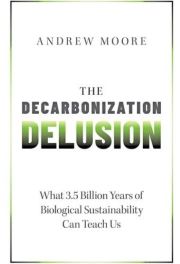The Decarbonization Delusion: What 3.5 Billion Years of Biological Sustainability Can Teach Us

Andrew Moore
Oxford University Press, £25.99
This is a most unusual but important book. I have empathy with the views in the first chapter of the book, which considers the origin of life, an approach to carbon which I have used myself in a recent book on life and sustainability. It proceeds to consider the role of carbon in life, including biochemical pathways such as the Krebs cycle, and the place of carbon in food cycles, something I again fully endorse. The book then moves to the core thesis on decarbonisation and the measures that have been taken to reduce our carbon footprint. In particular, Moore addresses this with detailed calculations of the footprint of battery technology over carbon-based fuels, especially in attempts to decarbonise the car. He argues that there have been serious misconceptions, especially with problems on battery life and disposal, and that increased use supported by governments could lead to grave environmental consequences.
In essence, such policy should be subject to life cycle assessment, although the author avoids using that term as such. Sustainability analysis is, by its very nature, holistic, and can lead to the effective use of carbon. This book, which has a strong biological base, is a very good read for those interested in the policy issues of today.
Professor Jim Lynch OBE FRSB
Reviewed by Professor Jim Lynch OBE FRSB, Distinguished Professor Life Sciences Emeritus, Centre for Environment and Sustainability, University of Surrey


